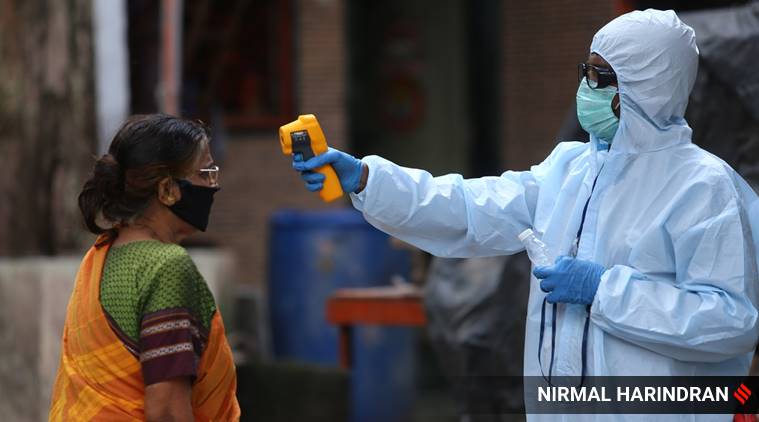 Health volunteers performing temperature scanning for covid-19 symptoms at Gul Mohammed Chawl in Dharavi. (Express photo by Nirmal Harindran)
Health volunteers performing temperature scanning for covid-19 symptoms at Gul Mohammed Chawl in Dharavi. (Express photo by Nirmal Harindran)
The World Health Organisation has praised the efforts taken to contain the spread of the COVID-19 in Dharavi, one of the world’s largest slums, underscoring the need for community engagement along with national unity and global solidarity to turn the pandemic around.
Dharavi, which is located in India’s commercial capital Mumbai, is spread over an area of 2.5 square kilometres and has a population of 650,000. People live in shanties and dilapidated buildings with narrow lanes and open sewers.
The first COVID-19 patient in Dharavi was found on April 1, nearly three weeks after Mumbai recorded its maiden positive case on March 11.
Follow Maharashtra coronavirus LIVE updates here
Addressing a virtual press conference here on Friday, WHO Director-General Tedros Adhanom Ghebreyesus said there were many examples from around the world that have shown that even if the outbreak is very intense, it can still be brought back under control.
“And some of these examples are Italy, Spain and South Korea, and even in Dharavi – a densely packed area in the megacity of Mumbai,” Ghebreyesus said.
On June 9, the tally of the coronavirus cases in Dharavi, once a COVID-19 hotspot in the city, reached 2,347 after nine new infections were detected.
Mumbai has recorded over 88,000 COVID-19 cases and 5,129 deaths.
Dharavi has only 291 active COVID-19 cases, while 1,815 patients have recovered and discharged from COVID-19 facilities.
Ghebreyesus also underlined that only aggressive action combined with national unity and global solidarity can turn the COVID-19 pandemic around.
He also stressed the importance of leadership, community participation and collective solidarity to control the virus.
“A strong focus on community engagement and the basics of testing, tracing, isolating and treating all those that are sick is key to breaking the chains of transmission and suppressing the virus,” he added.
On Saturday, India’s COVID-19 tally reached 8.2 lakh with 27,114 new cases with 22,123 deaths.
According to the Johns Hopkins University data, globally, there are over 12 million COVID-19 cases and the disease has claimed over 560,000 lives.